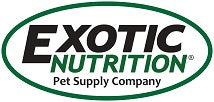Skunks require fresh all natural ingredients in their diet in order to thrive. With the guidance of leading veterinarians, Exotic Nutrition formulated a nutritionally balanced diet from the freshest all natural ingredients available.
Do not feed cat food under any circumstance.
Premium Skunk Diet contains the essential nutrients required for growth, maintenance, and reproduction. Combined with fruits & vegetables it provides superior nutrition for all life stages.
We recommend Exotic Nutritions' Premium Skunk Diet to be fed, along with a mixture of vegetables each day, with treats of dairy, nuts, eggs and other high calorie foods. By giving them as treats, weight is easier to control.
Offer Exotic Nutritions' Vita-Skunk as a food supplement (CONTAINS TAURINE). Vita-Skunk is a nutritional dietary supplement highly recommended for skunks. It was developed with the aid of a leading holistic veterinarian. This blend of vitamins, minerals, and Amino acids and will help ensure that your skunk receives proper daily nutrition.
Skunks generally do not drink a great deal of water, but clean water should always be available.
Make sure your skunk eats regularly. Never let a skunk go a day without eating. Try favorite foods, meat, fruit, yogurt. If your skunk won't eat, force feed pureed foods if necessary. Adults should be fed twice each day.
Monitor the weight of your skunk and make sure it is not getting too fat or to thin. A simple technique to determine how much fat an adult skunk has is to feel the base of the tail, there should be a ball of fat that gently tapers down the tail. If there is no fat at the base of the tail, you can feel the bones of the tail easily, the skunk is too thin. If you can't easily feel the bones about two-thirds of the way down the tail the skunk is getting overweight.
Fresh vegetables: broccoli, cauliflower, bok choy, napa, yellow squash, zucchini, green peppers, turnip, parsley root, dandelion, parsnip root, corn, peas, sugar snap peas, carrots, black carrots, endive, romaine lettuce, brussels sprouts, egg plant, green beans, wax beans, broccoli slaw, cole slaw, tomatoes, mushrooms, cucumbers, beets (watch for red poop), avocado (skin and seed are toxic), purple cabbage, alfalfa, bean sprouts, Spanish olive (few times a month), celery, cooked vegetables - potatoes, sweet potatoes, yams, acorn squash, butternut squash.
Fruits: pear, apple, blueberries, melon, banana, strawberry, cranberries (once in a great while).
Ready to Shop? Shop By Pet or Shop By Category
Got Questions? Browse more free Blogs or Contact Us with any inquiries regarding our products.
Notice: Exotic Nutrition cannot provide specific care guidelines on an individual basis. Please consult a veterinarian or experienced breeder or wildlife rehabilitator.
Exotic Nutrition is proud to serve hundreds of universities, zoological parks, veterinarians, research centers and other institutions seeking to advance the health and well-being of exotics worldwide. See a full list of institutions using our products here.
Exotic Nutrition has a heart for animals in need. Through regular donations to rescues, rehabilitators, and special fundraiser events, Exotic Nutrition is making a significant impact in the lives of animals. See a full list of our charitable donations here.

Leave a Comment